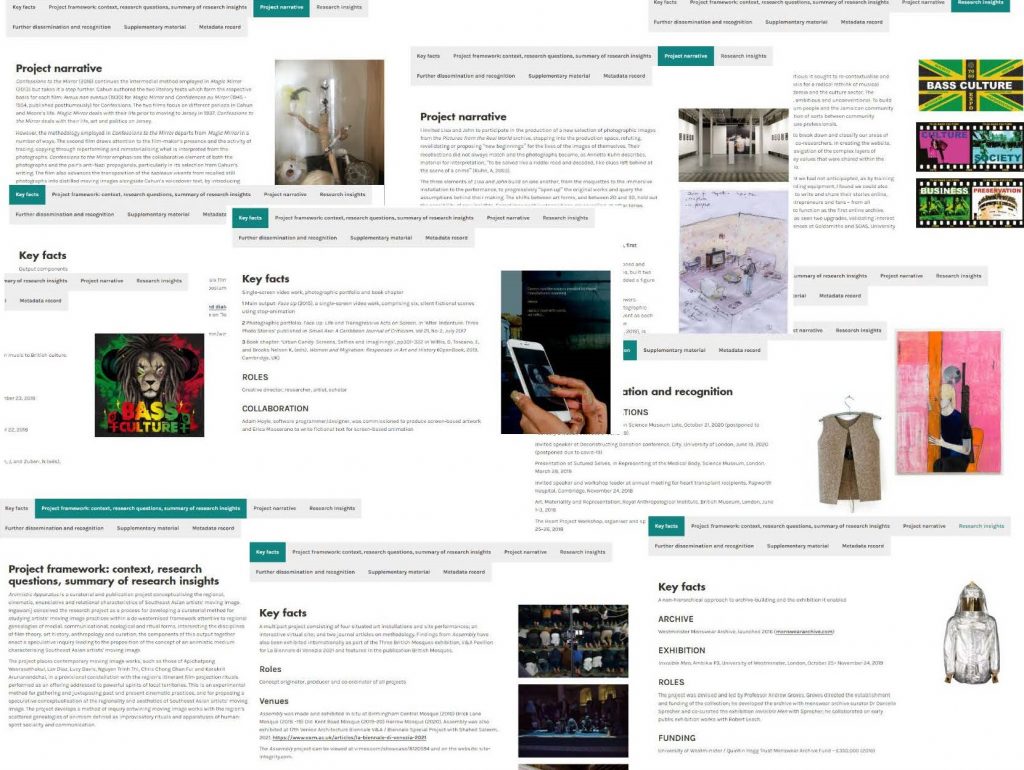Today’s post focuses on how practice-based research may benefit from being made more effectively shared. At Westminster we have prioritised improving our institutional repository (WestminsterResearch) to better support non-text based (also known as non-traditional) output types.
See article : Evans, Jenny, Nina Watts, Taylor Mudd, and Tom Renner. 2022. “From Legacy to Next Generation: A Story of Collaboration to Push the Boundaries of the Open Source Haplo Repository from Cayuse”. Insights 35: 14. DOI: http://doi.org/10.1629/uksg.582
This work led to a scoping project, funded by the Arts and Humanities Research Council (AHRC): Practice Research Voices (PRVoices), led by Jenny Evans in 2022, which brought external collaborators on board and looked at how the work we have done might scale to other practice research disciplines.
Non-text based output types in WestminsterResearch
At Westminster work has been ongoing to better capture and share these non-text (or non-traditional) research outputs. Whilst the outputs of practice research may fall into traditional publication types – articles, chapters and books, it is likely that outputs such as – artefacts, compositions, designs, digital or visual media, exhibitions or performances, may also be produced. You can add information about these outputs to the Virtual Research Environment (VRE) which populates your researcher profile and outputs list within WestminsterResearch – the publicly discoverable interface that sits on top of the VRE.
REF2021 Enhanced Portfolios

WestminsterResearch includes an innovative, sector-leading focus on art and design, enabling open access to and data sharing of practice-based research going beyond capturing traditional text-based outputs and research data. This enables all our research to be discoverable and accessible. In 2022 we launched our newly developed ‘enhanced portfolios’ output type in the VRE, which enables practice-based researchers to share and appropriately license images and videos, contextualise their practice with process and project narratives, and share practice-based research beyond text-based outputs. To date there are ten enhanced portfolios based on outputs submitted to Unit 32: Art and Design: History, Practice and Theory in the REF2021 open to view.
This new format allows practice-based arts research portfolios to have a clear and well-polished public presence. The portfolio records showcase not only the metadata and items within the portfolio, but also the research process undertaken leading to its creation.
If you submitted a portfolio to REF2021, we will be in touch, but should you wish that your portfolio is made open sooner, please contact us directly (email repository@westminster.ac.uk), and we can arrange a time to finalise your portfolio for open release.
Further uses for portfolios
You can use the portfolios functionality to draw together several individual outputs into one large ‘container’, allowing you to bring together several smaller pieces into an overarching collection. This can be used in any area of research, and you may wish to enter minimal additional information, i.e. only including links to the outputs in WestminsterResearch, giving it a title, and a description to help people understand what is contained. Or you may wish to include accompanying text in the form of Key Facts, Supplementary Information, or even the research process. If you think this may useful to you, and would like to know more, please email repository@westminster.ac.uk.
We are able to ‘mint’ DOIs (Digital Object Identifiers) for portfolios, allowing your research to have a permanent link that is citable and discoverable.
AHRC Funded Research: PR (Practice Research) Voices

Jenny Evans, our Research Environment & Scholarly Communications Lead, was the Principal Investigator of an AHRC funded project entitled Practice Research Voices (PRVoices): Scoping the Open Library of Practice Research in 2022. This project brought together librarians, information and research management professionals, and practice researchers in the creative and performing arts and other disciplines that create practice research (including architecture and education) to pose the following research questions:
- How to implement the recommendations of the second PRAG-UK report to develop a PR platform?
- How does the existing Cayuse (formerly Haplo) repository meet the needs of the wider PR community and what needs changing?
- How can the broader PR community be harnessed to ensure requirements and specifications are developed to be a set of transferable recommendations?
- What do these changes mean for the associated discoverability landscape of the repository and Persistent Identifier (PID) metadata standards?
- How to involve representatives of all stakeholders in an intersectional manner?
The project team will be publishing it’s findings very soon – keep an eye on the prvoices blog for further developments.
- Research Data Management for Open Access Week 2025: Who owns our Knowledge? - October 21, 2025
- Open Access Week 2025: Who Owns Our Knowledge? - October 20, 2025
- ENDED: Cogitatio Press - April 1, 2025
